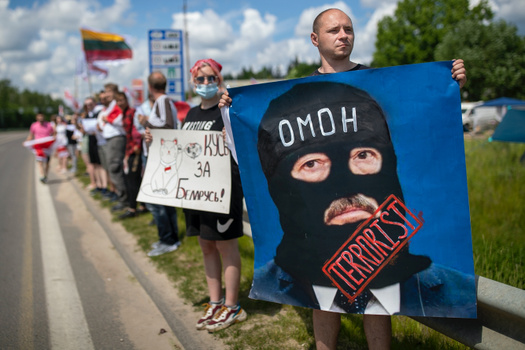
Then came the counter-revolution Political Analyst Artyom Shraibman breaks down the latest wave of mass repressions in Belarus
Мы рассказываем честно не только про войну. Скачайте приложение.
Since July 8, the authorities in Belarus have been carrying out a renewed wave of mass repressions. The security forces have conducted dozens of raids and arrests targeting human rights activists and journalists. Some of the detainees are facing multiple felony charges on accusations ranging from rioting to tax evasion. To find out what lies behind the latest phase of this prolonged crackdown (and if Vladimir Putin has anything to do with it) Meduza spoke to Belarusian political analyst Artyom Shraibman.

Belarus saw mass opposition protests in August 2020, but there has been no such thing this summer. Nevertheless, the authorities are continuing to carry out increasingly targeted repressions. “Now they’re destroying the [opposition's] infrastructure,” political analyst Artyom Shraibman tells Meduza. “Plus, it’s a reaction to the European sanctions, because the Belarusian government, like the Russian government, regards all NGOs as an extension of the West in their country. In Minsk they think, ‘We can’t punish Berlin, Brussels, and Washington, so we’ll hit their tentacles’.”
President Alexander Lukashenko’s regime responded to the August 2020 protests with brutal police violence. Protesters were jailed en masse and there were widespread reports of torture and abuse in Belarusian prisons. By comparison, Shraibman says that the repressions happening now are systematic, but no less cruel. At the same time, he finds this unsurprising. “This is all in the logic of an authoritarian government. This is what it promised to do [after the opposition protests],” he recalls.
Though Belarus has seen large-scale opposition protests in the past (for example, following the 2010 presidential election), Shraibman believes that last summer’s public backlash was “deeply traumatic” for the authorities. In this context, he says, the ongoing crackdown is a kind of “therapy,” in which the security forces “take revenge on all the troublemakers.”
“The bridges with the West have been burned already — there are no restraining factors,” he continues. “Earlier, there were people in the Belarusian system who said ‘Well maybe there’s no need, let’s go softer, let’s leave the channels of communication with the West [open]!’ Now there’s none of this and there’s no one to object to a new repressive initiative.”
Amid the latest crackdown in Belarus, Lukashenko flew to St. Petersburg to meet with Vladimir Putin for the fourth time this year. But Shraibman warns against reading too much into this meeting. “I don’t see a direct connection here [or] the need for Lukashenko to get permission and approval from Putin. He orchestrated repressions both before and after the meeting,” he explains. “On the other hand, if Putin didn’t like it, he could stop it — he has the tools. But he doesn’t abhor such methods. Putin lives by the same philosophy as Lukashenko. Yes, Lukashenko is acting tougher, but this is no reason to stop him.”
While Putin may not be calling the shots in Belarus, Shraibman admits that his political and economic support likely emboldens Lukashenko. Indeed, if the Russian president were to withdraw his backing, it would not only signal to the Belarusian opposition movement that Lukashenko’s regime had lost its main political ally, but also put incomparable economic pressure on the country. “Putin doesn’t even need sanctions to bring the Belarusian economy to its knees within a year. It [would be] enough for him to simply not meet Lukashenko’s new requests,” Shraiban says. “Taking into account the Western sanctions, after a year of this turn of events, Belarus wouldn’t have any reserves.” That said, the Kremlin doesn’t appear to have any desire to use this considerable leverage, he adds.
“In Putin’s eyes there’s no comfortable alternative to Lukashenko. All current alternatives are even more uncomfortable for Putin than he is,” Shraibman explains. “Lukashenko isn’t an angel from the Kremlin’s point of view either. He’s an uncomfortable interlocutor, but he fulfills the most important function — he doesn’t let Belarus follow the path of Ukraine and get closer to the West. And the further down the rabbit hole [he goes], the more it blocks such movements.”
Asked about the current state of the protest movement, Shraibman says that it’s in a “reactionary phase.” “The revolution didn’t win a quick victory, and after it comes the counter-revolution, the reaction,” he explains. At the same time, Lukashenko’s ongoing repressions have set a “ceiling” for the level of support he can expect from Belarusians. And the way Shraibman sees it, there’s no way for him to make a comeback. “Previously, he’d have a downturn in ratings, but then thanks to economic support from Russia or a more relaxed economic policy, he managed to return his rating to about 50 percent by the elections,” the political analyst recalls. “Now he won’t be able to get even 20–30 percent support because of what he did with the Belarusian opposition.”
Be that as it may, Shraibman predicts a slow death for the Lukashenko regime. “We’re doomed to live in a state of permanent, smoldering crisis until the end of Lukashenko’s rule. How long this smolder and decay will last no one can say,” he says. “On the one hand, the authorities understand that they’re forced to constantly intensify repressions, which isn’t cheap in terms of reputation, sanctions, and support in society. On the other hand, there’s anxiety among the protesters because of the massive repressions. Anxiety is the only thing that’s bringing the poles of Belarusian society together now.”
In this context, the predominating feeling is one of frustration, Shraiban says. Indeed, this political clash has created a crisis too deep to be ignored. “Everyone understands that Belarusian society will not return to the balance that there was in mid-2020. There’s no longer a functioning social contract that sometimes fails, but allows the authorities to exist in peace,” he warns.
Asked if he thinks there’s a chance that mass protests will resume, Shraiban replies that the authorities’ actions may very well trigger another wave of dissent — even choosing to backtrack on repressive measures could be seen by the opposition movement as a window of opportunity. “The anger hasn’t gone anywhere, but the reason [for the protests] may be different. And this is the most important thing,” he concludes. “We don’t know how soon there will be that spark that’s serious enough to overcome the deterring factor of repressions. But history shows that a suppressed revolution is doomed to return, it’s simply not clear in what way.”
Please note. This interview has been summarized for length and clarity. You can read Meduza’s full Q&A with Artyom Shraibman in Russian here.
Interview by Alexandra Sivtsova
Summary by Eilish Hart